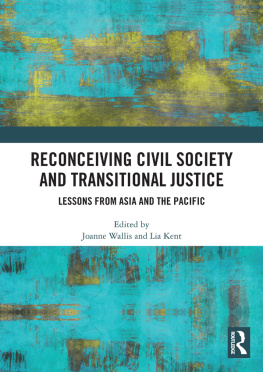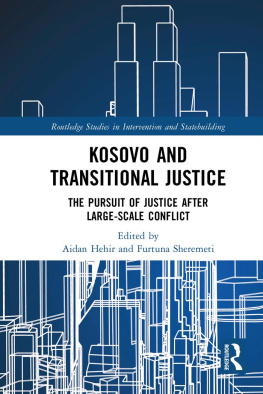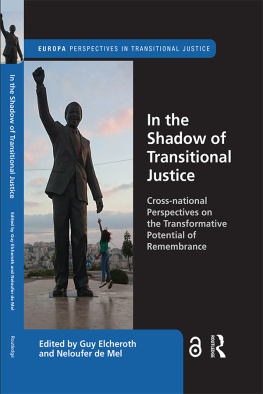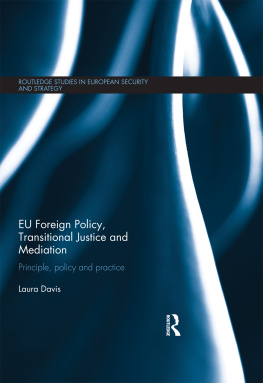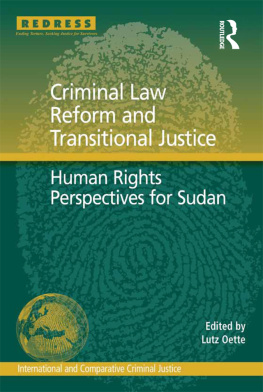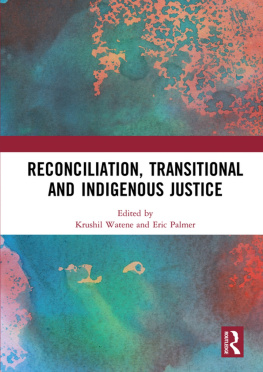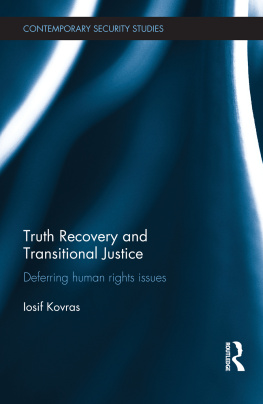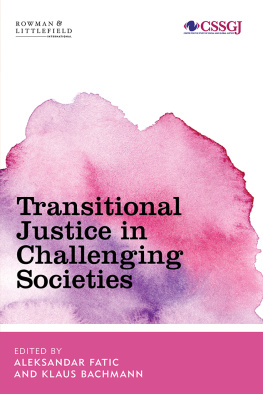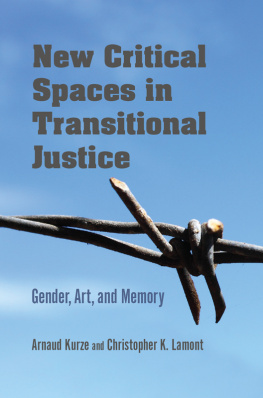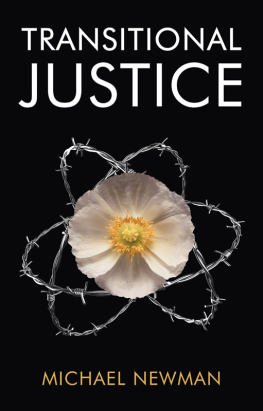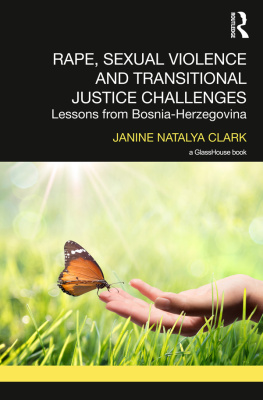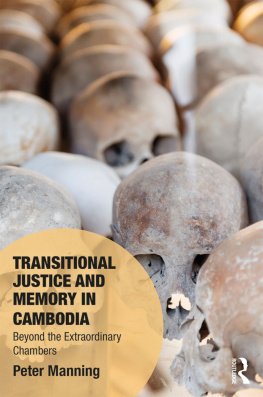Reconceiving Civil Society and Transitional Justice
Reconceiving Civil Society and Transitional Justice examines the role of civil society in transitional justice, exploring the forms of civil society that are enabled or disabled by transitional justice processes and the forms of transitional justice activity that are enabled and disabled by civil society actors.
Although civil society organisations play an integral role in the pursuit of transitional justice in conflict-affected societies, the literature lacks a comprehensive conceptualisation of the diversity and complexity of these roles. This reflects the degree to which dominant approaches to transitional justice focus on liberal-legal justice strategies and international human rights norms. In this context, civil society organisations are perceived as intermediaries who are thought to advocate for and support formal, liberal transitional justice processes. The contributions to this volume demonstrate that the reality is more complicated; civil society can and does play important roles in enabling formal transitional justice processes, but it can also disrupt them. Informed by detailed fieldwork across Asia and the Pacific Islands, the contributions demonstrate that neither transitional justice nor civil society should be treated as taken-for-granted concepts.
Reconceiving Civil Society and Transitional Justice will be of great interest to scholars of Security Studies, Asian Studies, Peacebuilding, Asia Pacific, Human Rights, Reconciliation and the Politics of Memory.
The chapters were originally published as a special issue of Global Change, Peace & Security.
Joanne Wallis is an Associate Professor in the Coral Bell School of Asia Pacific Affairs in the College of Asia and the Pacific at the Australian National University, Canberra, Australia. Her research focuses on peacebuilding and security in the Pacific Islands.
Lia Kent is a Visiting Fellow in the School of Regulation and Global Governance (RegNet) in the College of Asia and the Pacific at the Australian National University, Canberra, Australia. Her research focuses on transitional justice and the politics of memory in Southeast Asia.
Reconceiving Civil Society and Transitional Justice
Lessons from Asia and the Pacific
Edited by
Joanne Wallis and Lia Kent
First published 2020
by Routledge
2 Park Square, Milton Park, Abingdon, Oxon, OX14 4RN
and by Routledge
52 Vanderbilt Avenue, New York, NY 10017
Routledge is an imprint of the Taylor & Francis Group, an informa business
2020 Taylor & Francis
All rights reserved. No part of this book may be reprinted or reproduced or utilised in any form or by any electronic, mechanical, or other means, now known or hereafter invented, including photocopying and recording, or in any information storage or retrieval system, without permission in writing from the publishers.
Trademark notice: Product or corporate names may be trademarks or registered trademarks, and are used only for identification and explanation without intent to infringe.
British Library Cataloguing-in-Publication Data
A catalogue record for this book is available from the British Library
ISBN13: 978-0-367-46974-0
Typeset in Myriad Pro
by codeMantra
Publishers Note
The publisher accepts responsibility for any inconsistencies that may have arisen during the conversion of this book from journal articles to book chapters, namely the inclusion of journal terminology.
Disclaimer
Every effort has been made to contact copyright holders for their permission to reprint material in this book. The publishers would be grateful to hear from any copyright holder who is not here acknowledged and will undertake to rectify any errors or omissions in future editions of this book.
Contents
Joanne Wallis and Lia Kent
Volker Boege
Joanne Wallis
Lia Kent
Birgit Bruchler
Dahlia Simangan and Rebecca Gidley
The chapters in this book were originally published in the Global Change, Peace & Security, volume 31, issue 2 (June 2019). When citing this material, please use the original page numbering for each article, as follows:
Introduction
Special issue on reconceiving civil society and transitional justice: lessons from Asia and the Pacific
Joanne Wallis and Lia Kent
Global Change, Peace & Security, volume 31, issue 2 (June 2019) pp. 129138
Chapter 1
Reconciliations (Melanesian style) and transitional justice
Volker Boege
Global Change, Peace & Security, volume 31, issue 2 (June 2019) pp. 139157
Chapter 2
The role of uncivil society in transitional justice: evidence from Bougainville and Timor-Leste
Joanne Wallis
Global Change, Peace & Security, volume 31, issue 2 (June 2019) pp. 159179
Chapter 3
Transitional justice and the spaces of memory activism in Timor-Leste and Aceh
Lia Kent
Global Change, Peace & Security, volume 31, issue 2 (June 2019) pp. 181199
Chapter 4
From transitional to performative justice: peace activism in the aftermath of communal violence
Birgit Bruchler
Global Change, Peace & Security, volume 31, issue 2 (June 2019) pp. 201220
Chapter 5
Exploring the link between mine action and transitional justice in Cambodia
Dahlia Simangan and Rebecca Gidley
Global Change, Peace & Security, volume 31, issue 2 (June 2019) pp. 221243
For any permission-related enquiries please visit:
http://www.tandfonline.com/page/help/permissions
Volker Boege is an Honorary Research Fellow with the School of Political Science and International Studies at The University of Queensland in Brisbane, Australia.
Birgit Bruchler is a Senior Lecturer at the School of Social Sciences, Monash University, Melbourne, Australia.
Rebecca Gidley teaches at the College of Asia and the Pacific at the Australian National University, Canberra, Australia.
Lia Kent is a Visiting Fellow in the School of Regulation and Global Governance at The Australian National University, Canberra, Australia.
Dahlia Simangan is an Assistant Professor at Hiroshima Universitys Graduate School for International Development and Cooperation (IDEC) and Network for Education and Research on Peace and Sustainability, Japan.
Joanne Wallis is an Associate Professor in the Coral Bell School of Asia Pacific Affairs in the College of Asia and the Pacific at the Australian National University, Canberra, Australia.
Joanne Wallis and Lia Kent
ABSTRACT
This article, and the special issue it introduces, joins an emerging conversation about the role of civil society in transitional justice (TJ). Although civil society organisations play an integral role in the pursuit of TJ in conflict-affected societies, the literature lacks a comprehensive conceptualisation of the diversity and complexity of these roles. Building on an interdisciplinary workshop at the Australian National University in September 2016, the contributions to this special issue explore the forms of civil society that are enabled and disabled by TJ processes and the forms of TJ activity that are enabled and disabled by different kinds of civil society actors.

